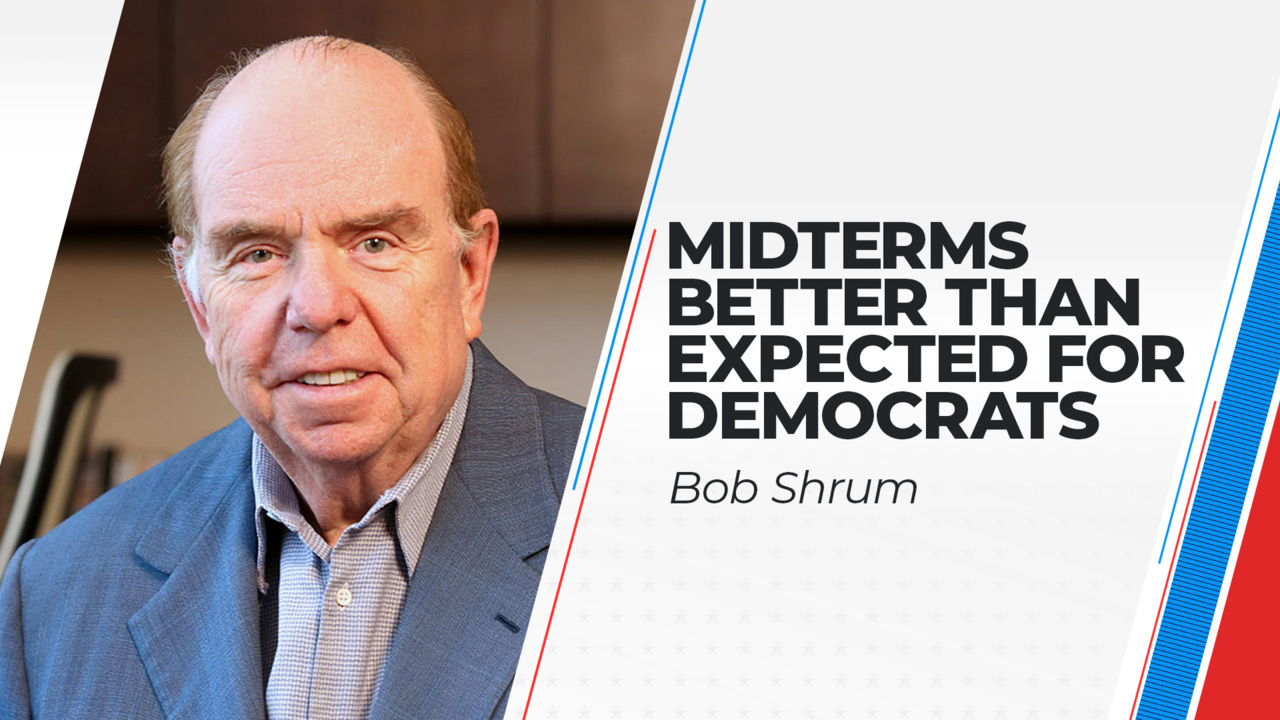
SHANNON LONGWORTH: As results come in the house is still projected to likely go to Republicans and the Senate remains a toss up.
SIMONE DEL ROSARIO: Let’s take a look at some of those races right now as we dissect our balance of power first with the Senate. We see that right now we have 42. Democrats in the Senate and 41. Republicans still waiting on a lot of results coming in. As we switch over to the house right now. A lot of seats left to be filled on this one, as we have 97. Republicans in this house 255 Democrats to discuss.
LONGWORTH: We’re here with Bob Shrum Democratic strategist and director of the USC center for the political future. Bob, where did Democrats go wrong during this cycle?
BOB SHRUM | DEMOCRATIC STRATEGIST, DIR. USC CENTER FOR THE POLITICAL FUTURE: Well, actually, I don’t think they went wrong. I mean, given people’s feelings and perceptions about the economy, which actually is better than they think. But they think it’s terrible. It’s this is the best performance for an incumbent president’s party in a midterm election. Since 2002.
This is not a red wave, it’s not a red tsunami, it’s a red wavelet, or a red ripple.
Republicans are in my view, going to take the house, but they’re not going to pick up 35 or 45 seats, they’re going to take it by a much more modest margin than that. And I think Democrats are probably going to hold the Senate, although that may have to wait until a runoff election in Georgia in December, depending on whether or not one of the other one of the two candidates in Georgia doesn’t go over the 50%. Mark.
DEL ROSARIO: It is early. But of course, we know that people are prepared for that runoff. You talk about the economy. And certainly there are some contradictory elements of it, as you said, some strength in the economy. But of course, there’s no way to twist the fact that for decades, high inflation is very bad for Americans, as we enter into this economic cycle and into this picture. Is the economy a lose lose situation for the Democrats, as they try to convince people that they’re the people to be in power?
SHRUM: Well, you got two more years now before the next election. And I think this inflation is beginning to obey, we’ll see if the economy continues to perform strongly in terms of jobs. So that story has yet to be written. But I talked to someone tonight who was involved in a very tough congressional race in Rhode Island, where the Republican led in every single poll and the Democrat one. And in the last three weeks, the Democrats message was centered around the economy, and said, the reason that you’re suffering from inflation is because you’re being exploited by the oil companies, you’re being exploited by the pharmaceutical companies, you’re being exploited by big businesses in ways that are raising prices, and you’re paying more. The truth is Joe Biden can’t solve this problem on his own. But on the other hand, it just say that is purely defensive, doesn’t get you anywhere. Herbert Hoover road tested the argument that economic conditions were a function of international conditions in 1932. And it didn’t work out very well. So maybe a more populous democratic message on the economy would be more powerful going forward.
DEL ROSARIO: Because you just said, I think, a really important point three weeks ago that messaging change for the Democrats there. Do you wish that they had been doing that a lot sooner?
SHRUM: Yeah, so I think that I think Democrats should have talked more about the economy, although I also do not agree with the conventional notion that abortion faded as an issue. For example, in Pennsylvania, at least in the exit polls before they’re adjusted. I don’t know where they’ll end up when they’re finally adjusted. Abortion actually was slightly higher than the economy on the list of issues that were moving voters.
LONGWORTH: Democrats are looking at potential losses in several high profile races, including Senate seats in Ohio and Wisconsin. Meanwhile, they didn’t put up much of a fight in gubernatorial races in Georgia and Florida, where they put up candidates which had lost previously. What happened there.
SHRUM: Please, I think you guys are coming from a completely different place than I am. I mean, Democrats have done very well in these governor’s races. And I want to see what happens in Arizona. I never thought that we were going to win the Democrats were going to win Florida, and Beto O’Rourke put up a good fight in Texas. And I think Texas is a couple of cycles away from being a possible blue state. But I’m gonna go back to my point. My point is that not since 2002, has the party of an incumbent President done this well in the midterm elections?
DEL ROSARIO: Well, we have a lot to find out about the midterm elections tonight and you mentioned this the
the party in power typically does do pretty poorly in the midterms. Not to mention it has been a difficult year economically, what would be a victory for the Democrats tonight?
SHRUM: Holding on to the Senate would be a big victory. Even if Democrats lost the Senate by one vote, lost the house by 20 seats are 23 seats. That would be a very unusual performance, given the averages that we’ve seen over the years.
DEL ROSARIO: All right, Bob Strom Democratic strategist and director of the USC center for political future. Thank you so much for your time today. We really appreciate it.
SHRUM: Okay, thank you.










